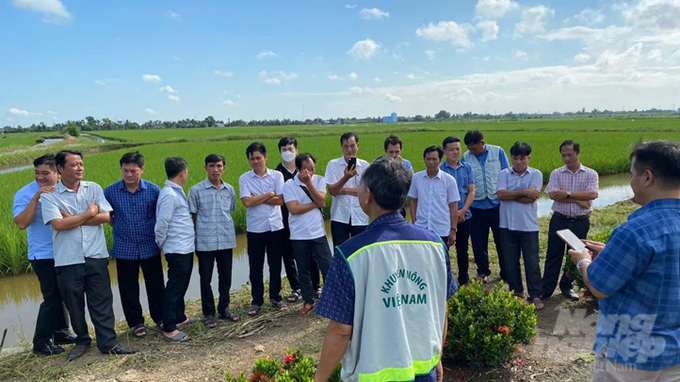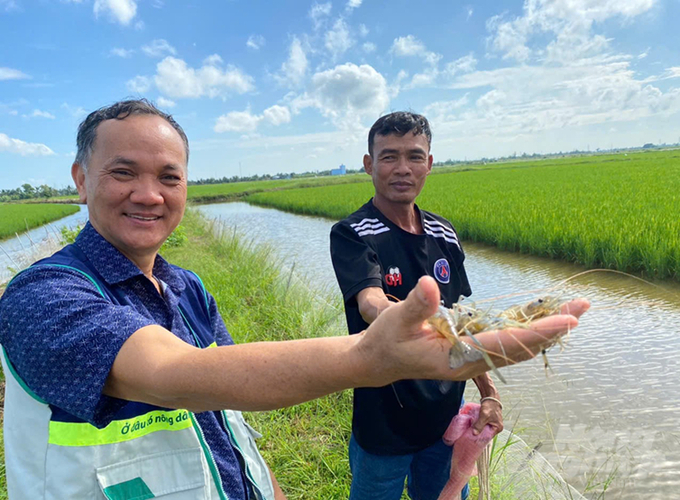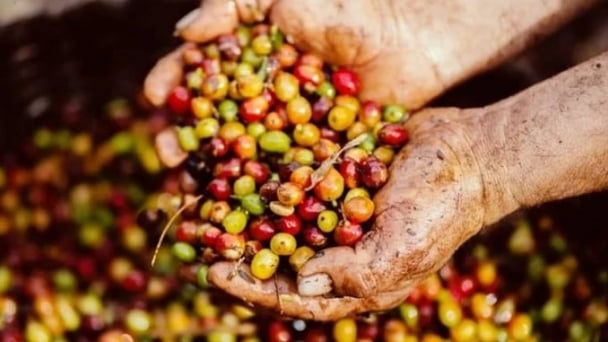June 17, 2025 | 19:19 GMT +7
June 17, 2025 | 19:19 GMT +7
Hotline: 0913.378.918
June 17, 2025 | 19:19 GMT +7
Hotline: 0913.378.918

Farmers attending a training session. Photo: Trong Linh.
The National Agricultural Extension Center, in collaboration with the Ca Mau Agricultural Extension Center, recently organized a training course aimed at enhancing the capacity of local community agricultural extension teams. The course is part of a project titled “Improving the Effectiveness of Agricultural Extension Activities with the Aim of Consolidating the Community Agricultural Extension Model.” The project is scheduled for implementation from 2024 to 2025.
During the training process, participants gained knowledge on agricultural extension organization, operational regulations, and community-based agricultural extension. The course covered skills for providing agricultural extension services, high-quality and low-emission rice cultivation techniques, and solutions for organic, circular, and low-emission farming. Additionally, the training program also emphasized the role of community agricultural extension in implementing Sustainable Development Project for one million hectares of specialized, low-emission high-quality rice in association with green growth in the Mekong Delta region by 2030.
Additionally, participants received training in key skills for community agricultural extension, including production and trading planning, contract negotiation for agricultural cooperatives, digital transformation in agricultural production, and advisory solutions for promoting community agricultural extension in the digital transformation process.

A rice and giant freshwater prawn farming model in Hamlet 5, Tri Luc Commune, Thoi Binh District. Photo: Trong Linh.
During the training process, participants visited a rice and giant freshwater prawn farming model in Hamlet 5, Tri Luc Commune, Thoi Binh District. Subsequently, leaders from Tri Luc Commune and the local community agricultural extension team shared insights on the team’s duties and responsibilities. They also outlined production processes that promote quality standards, food safety, and compliance with market and business demands. Furthermore, local community agricultural extension teams provide consultations and connect farmers with businesses, cooperatives, and collaborative groups to promote digital transformation in agricultural production.
The training course provided participants with a comprehensive understanding of the roles and responsibilities of agricultural extension services and community agricultural extension teams in modern agricultural production. It also highlighted the value of fostering community engagement, developing agricultural tourism, advancing rural development, and supporting the agriculture sector in addressing new challenges.
Translated by Nguyen Hai Long
![Turning wind and rain into action: [5] Hue applies modern technology in disaster forecasting](https://t.ex-cdn.com/nongnghiepmoitruong.vn/608w/files/news/2025/06/17/z6704423696987_15fd32ffc26d590d204d520c9dac6786-nongnghiep-093938.jpg)
(VAN) In Hue city, modern technology has recently been applied in meteorological and hydrological forecasting and warning, helping to reduce the damage caused by natural disasters.

(VAN) A cutting-edge farming technique being implemented on an experimental ranch in Arizona's Sonoran Desert has already saved a billion gallons of water over five years, according to Civil Eats.

(VAN) Poultry and pig production and the environment can be boosted through enhanced water technology, according to new research.

(VAN) Coffee prices on June 16, 2025 are unchanged. In Vietnam, local trading prices are holding steady, ranging around VND 112,000 – VND 112,500/kg.
![Turning wind and rain into action: [4] Bringing climate bulletins to remote and isolated areas](https://t.ex-cdn.com/nongnghiepmoitruong.vn/608w/files/linhnhp/2025/06/14/1152-z6704423696987_15fd32ffc26d590d204d520c9dac6786-nongnghiep-151141.jpg)
(VAN) The Vietnam Agriculture and Nature Newspaper interviewed Mr. Vu Thai Truong, Acting Head of Climate Change and Environment at UNDP Vietnam, to gain deeper insight into how climate bulletins are delivered to farmers.

(VAN) In Tien Giang, a high-tech shrimp farm has developed a distinctive energy-saving farming model that has yielded promising results.
![Turning wind and rain into action: [3] 300.000 farmers benefit from agro-climatic bulletins](https://t.ex-cdn.com/nongnghiepmoitruong.vn/608w/files/news/2025/06/12/e5a48259d6a262fc3bb3-nongnghiep-125122.jpg)
(VAN) The agro-climatic bulletin has become a valuable tool for farmers in the Mekong Delta. After more than five years of implementation, the initiative is gradually being expanded nationwide.